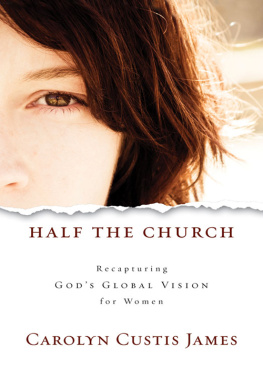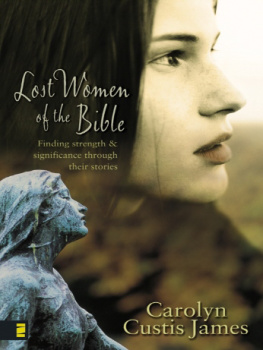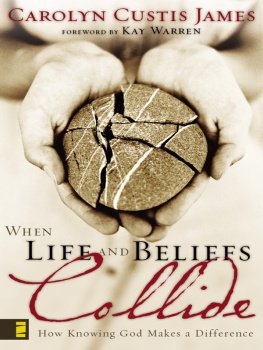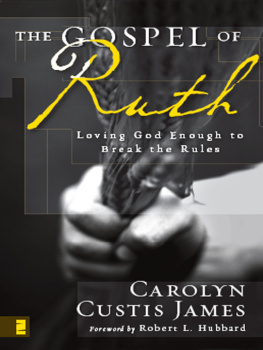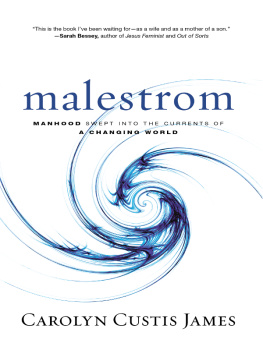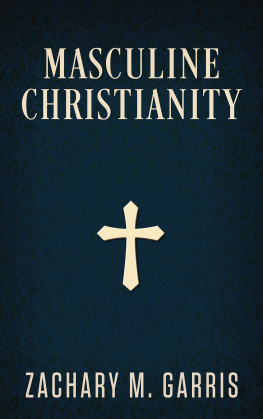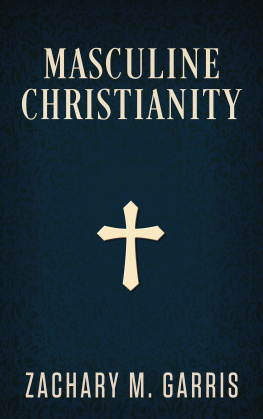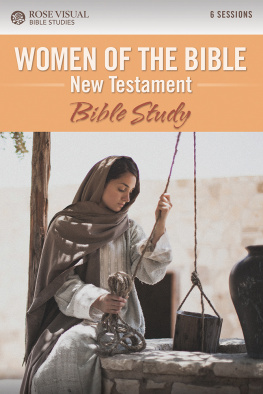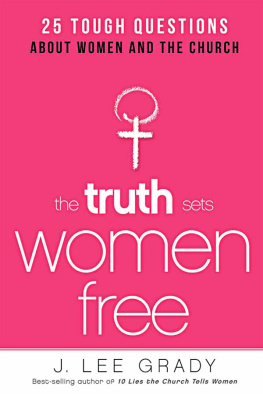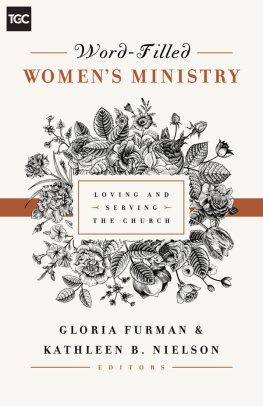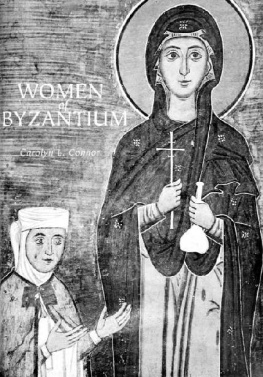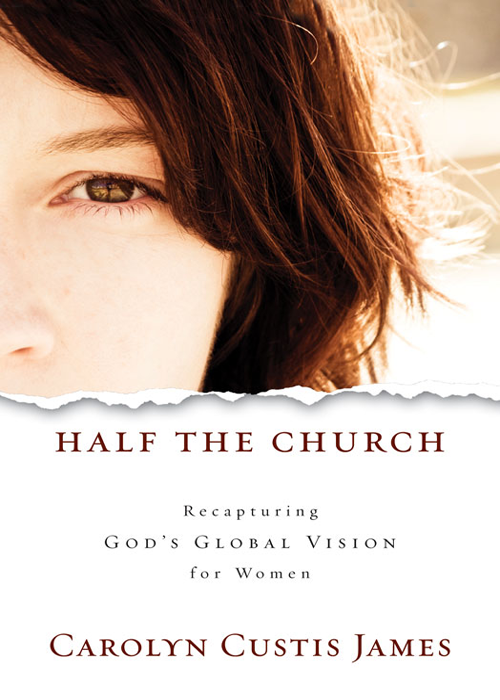HALF THE CHURCH
Recapturing
G ODS G LOBAL V ISION
for Women
C AROLYN C USTIS J AMES

With love
to my cousin Karen Custis Wilson
who is better than a sister to me
and
to the women of Synergy
a growing company of ezers-warriors who are
blessing the church and the world with their gifts.
C ONTENTS
INTRODUCTION
S EEING B EYOND O URSELVES
There is more to us than we know.
If we can be made to see it,
perhaps for the rest of our lives
we will be unwilling to settle for less.
S ometimes when youre searching for answers, you get more than you bargained for. My search for answers began in earnest in the years after college when I landed in a stretch of singleness I didnt see coming that dragged on for years. It was the first of many chapters in my story where the plot read differently from what I was expecting and where I was pulled unwillingly into a struggle with God and into questions about my purpose as a woman. Ive been asking questions ever since.
I am not alone. Other women are asking hard questions too. The reality that we are living in a fallen world confronts us every day. Still, we cant help wondering why God is silent when that brokenness invades our lives. Every day we are bombarded with new questions as the twenty-first century hurtles forward at a wild speed that has everyone hanging onto their hats and scrambling to keep up with the changes. During the latter half of the twentieth century, doors swung open for women (some after significant effort) that had been New York Times op-ed columnist Gail Collins escorts the reader on a mind-boggling journey from the 1960s to the present and examines the revolutionary changes that women in America currently enjoy and that young women today simply take for granted. In many ways for so many Western women, it is an exciting time to be alive.
Yet at the same time, like a nagging cough, the same old problems have traveled with us into this new era and leave us wondering if some things will ever change. Questions and uncertainty over a womans identity, purpose, and calling persist. We are constantly bewildered over Gods mysterious ways and unnerved by his silence when we need him most. And, of course, the ongoing struggles between the sexes have a sticking power that seems to resist our best attempts to resolve them.
It is perhaps ironic that in the twenty-first century we are looking for answers in an ancient Middle Eastern book a book produced in a society that is alien to our postmodern Western world in time, culture, and a million other ways. But as Christians we owe it to ourselves and to our daughters to find out if the ancient message for women in the Bible is still relevant in the twenty-first century or if, as many suggest, we have outgrown its message. Does Gods vision for his daughters equip us to move boldly into the future or summon us to retreat into the past? Does it break down when things go wrong for us, or is it robust enough to remain intact no matter what happens? Is his vision big enough to include every womans story from the beginning to the final chapter?
These questions have propelled my work. Listening to the questions of other women and girls has stretched the parameters of my search, for although I am passionate about finding answers for myself, I cant put my weight down on answers that collapse under other womens stories. It also became apparent to me early on that this conversation is dangerously incomplete and certain to produce flawed conclusions if we exclude our sisters in other cultures around the world. The conversation about Gods vision isnt American or Western or middle class. It is global. I knew that going in.
Even though the journey has been agonizing for me at many points, I wouldnt trade those eye-widening moments of discovery for anything, and I have had many. The winding path of questions eventually led me to a rich, wide-open space where God is spreading before his daughters a vast global vision that frees us to follow wherever he leads.
The thrill of each new discovery has been tempered every time by a weight of grief that to this day hasnt lifted. I grieve over the opportunities and blessings I have wasted because I didnt know about Gods vision for his daughters I didnt realize God expected so much of me. I grieve the loss to the church when so many Christian women believe its possible to subsist on an anorexic spiritual diet. I grieve that far too many women and girls are living with small visions of themselves and of their purpose. I grieve the loss to our brothers who are shouldering burdens we were created to share and are doing kingdom work without us when God means for us to build his kingdom together.
When half the church holds backwhether by choice or because we have no choiceeverybody loses and our mission suffers setbacks. Tragically, we are squandering the opportunity to display to an embattled world a gospel that causes both men and women to flourish and unites us in a Blessed Alliance that only the presence of Jesus can explain. Grief in me created a burning in my bones because we are not trumpeting this message within our ranks and to those outside. I knew I had to do something.
A trilogy of books When Life and Beliefs Collide, Lost Women of the Bible, and The Gospel of Ruthchronicle my journey and the discoveries I have made along the way. Each book led me deeper in my search into the Scriptures and opened up more of Gods ever-widening vision for his daughters. The book you hold in your hand is the fourth. But it is different from the others and requires a bit of explaining.
At first my purpose in writing this book was simply to put into a single volume the ideas that were simmering and evolving in those first three books but are scattered in different chapters. Much as I hope others will take that journey with me and read the first three books, I wanted to put a stake in the ground with this book to say this is where Ive come so far in my understanding of Gods vision for us. Little did I realize that although I have done exactly that, even this book has taken on a life of its own and pushed me further down the road. As I said, sometimes you get more than you bargain for.
In September 2009, my husband handed me a New York Times review of a newly released book authored by Pulitzer Prize-winning authors and husband/wife team, Nicholas Kristof and Sheryl WuDunn. A quick online visit to Amazon. com, a couple of mouse clicks, and in a matter of days I was pouring over Half the Sky: Turning Oppression into Opportunity for Women Worldwide. It was a watershed moment for me.
Half the Sky is a disturbing expos of the worlds dark and largely forgotten underbelly where the misery and abuse of women and girls break the scales of human suffering. If you havent read it already, it belongs on your reading list. Sex trafficking, female genocide, genital mutilation, and honor killings are but a few of the atrocities against millions of women and girls that the book brings to light. These may not be normal topics of polite conversation or suitable bedtime reading, but Kristof and WuDunn fearlessly identify a battlefield of epic proportions that the civilized world needs to engage. Here evil has gained the upper hand and countless souls are trapped, helpless to break free without significant outside help.

